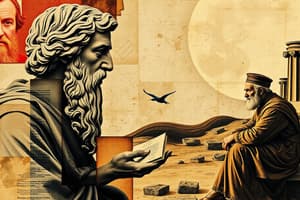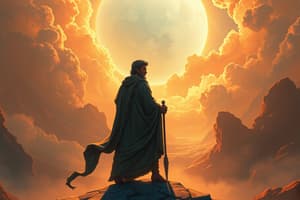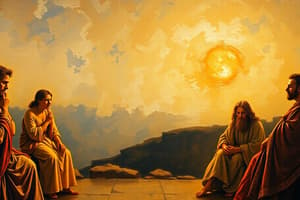Podcast
Questions and Answers
Who is known for coining the phrase 'know thyself'?
Who is known for coining the phrase 'know thyself'?
- Socrates (correct)
- Aristotle
- Plato
- Cicero
Which philosopher is recognized as the author of the 'Republic'?
Which philosopher is recognized as the author of the 'Republic'?
- Anselm
- Quintillian
- Aristotle
- Plato (correct)
Who is known as the Father of Modern Sciences?
Who is known as the Father of Modern Sciences?
- Cicero
- Abelard
- Quintillian
- Aristotle (correct)
Which philosopher wrote 'Institution Oratoria' and was renowned as a Grammaticus?
Which philosopher wrote 'Institution Oratoria' and was renowned as a Grammaticus?
Who is recognized as the father of scholasticism?
Who is recognized as the father of scholasticism?
Which philosopher emphasized the importance of education being aligned with the needs of society?
Which philosopher emphasized the importance of education being aligned with the needs of society?
Who defined education as the natural, symmetrical, and harmonious development of a child's faculties?
Who defined education as the natural, symmetrical, and harmonious development of a child's faculties?
Who wrote 'Emile', focusing on education in accordance with the child's nature?
Who wrote 'Emile', focusing on education in accordance with the child's nature?
What concept is associated with John Locke regarding human development?
What concept is associated with John Locke regarding human development?
Which educator is credited with being the father of kindergarten?
Which educator is credited with being the father of kindergarten?
Flashcards are hidden until you start studying
Study Notes
Ancient Philosophers and Their Contributions
- Socrates emphasized self-knowledge with the principle of “know thyself,” highlighting the importance of introspection in personal development.
- Plato, a student of Socrates, authored the influential philosophical text "Republic," which explores justice, the ideal state, and the philosopher-king concept.
Aristotle and His Influence
- Aristotle is recognized as the Father of Modern Sciences due to his empirical approach and systematic observation in various fields such as biology, ethics, and politics.
Roman Rhetoric and Philosophy
- Cicero, an important statesman and philosopher, penned "Oratore," a work that examines rhetoric and is crucial in the study of oratory and persuasion techniques.
- Quintilian, a renowned Roman rhetorician and educator, wrote "Institutio Oratoria," which serves as a comprehensive guide on classical rhetoric and teaching oratory skills; he was also known as a grammaticus, a specialist in grammar.
Medieval Philosophy
- Anselm is noted as the Father of Scholasticism, a medieval school of thought that sought to reconcile faith and reason, particularly through his ontological argument for the existence of God.
- Abelard was a prominent philosopher who advanced the philosophy of Conceptualism, a view that posits universals exist but only in the mind, challenging the notions of realism and nominalism.
Socrates to Aristotle
- Socrates emphasized the importance of self-awareness with the maxim "know thyself."
- Plato authored "Republic," exploring justice, political philosophy, and the ideal state.
- Aristotle is known as the Father of Modern Sciences for his empirical approach to studying the natural world.
Roman Contributions
- Cicero wrote "Oratore," which outlines principles of rhetoric and the art of persuasion.
- Quintilian, a renowned Grammaticus, authored "Institution Oratoria," focusing on rhetoric and education.
Medieval Thinkers
- Anselm is regarded as the Father of Scholasticism, integrating faith and reason in philosophy.
- Abelard was a prominent figure in Conceptualism, emphasizing the role of concepts in understanding.
Educational Philosophy and Humanism
- St. Thomas Aquinas authored "Summa Theologiae," synthesizing theology and philosophy.
- Erasmus, a humanist, advocated for education tailored to societal needs and emphasized understanding children's character.
- Ascham criticized corporal punishment in English schools through his work "The Schoolmaster."
Pioneers of Modern Education
- John Amos Comenius, known as the Father of Modern Education, created the first picture book "Orbis Sensualium Pictus."
- Mulcaster argued that education should respect and align with the natural development of children.
Enlightenment and Beyond
- John Locke's concept of "tabula rasa" described the mind as a blank slate shaped by experience.
- Jean-Jacques Rousseau wrote "Emile," promoting education that aligns with the child's inherent nature.
Developmental and Philosophical Approaches
- Pestalozzi viewed education as the natural, balanced, and harmonious development of a child's capacities.
- Herbart's educational theories focused on moral and virtuous development, contributing to the Herbartian Method in psychology.
Influential Educators and Concepts
- Friedrich Froebel is recognized as the Father of Kindergarten, emphasizing play in early education.
- John Dewey asserted that "education is not preparation for life; it is life," highlighting the experiential nature of learning.
- St. John Baptiste de la Salle is revered as the patron saint of teachers, influencing modern educational practices.
- Maria Montessori championed child-centered education, emphasizing prepared environments for learning.
Studying That Suits You
Use AI to generate personalized quizzes and flashcards to suit your learning preferences.




